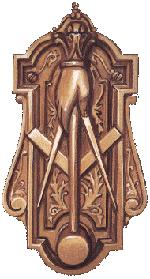
Masonry and The City In The Dawn




A Sign, Grip, and Word

"My friend," asked Yates very seriously, "did you ever hear of the Masons?"
"Masons? You mean stoneworkers, builders, the kind King Solomon borrowed from Hiram of Tyre to build the Temple-in the bible, you know?"
The City In The Dawn is full of writing about the Masons; the oldest fraternal order in the World. This is no truer than in the book, Bedford Village. It is during Salathiel's stay at Bedford that he is initiated into the Masons.
Although Hervey Allen was not a Mason, he spent a lot of time in Virginia studing Freemasonry. He captured the tenents of the "Brotherhood" very well, indeed.
Why the Masons?
Hervey Allen gives a special nod to the fact that Masonry, the modern re-emergence of which had it's roots in early 18th Century England, was gaining an important and fundamental hold in the Colonies. Soon, what apparently seemed on the surface to be a disjointed wilderness frontier, was in fact joined together with the cement of Brotherly Love and Friendship, that cement which unites the building into one common mass.
Hervey Allen wrote, "The effect of it's propogation was to bring a sense of order and to give a point and direction to the existence of many who had heretofore been without either, unable to see anything in the universe but the chaos of nature in the wilderness that surrounded them."
There are other ways that Masonry figures into these great books. Salathiel is a widow's son - - an important feature in Masonry. There is the journey to the East, and there are the numerous instances of men working together, whether building the "ark" or organizing a group of fighters that hints at the Masonic ideal of "who best can work and best agree." The very development of Salathiel on his journey eastward; Entered Apprentice, Fellowcraft and finally Master is akin to a Masonic journey. Finally, there is charity towards your fellow man, plain dealing, and circumspection.
Roll of Masons
Reverend James McArdle
Edward Yates
Captian Simeon Ecuyer
Garrett Pendergass
Mr. Gladwin
Captain Jack
Dr. Boyd
Captain Lewis Ourry
Salathiel Albine
Nat Murray
Tom, Mat, and Mark Pendergass
"In North America Masonry in sundry and various ways filled vital and long-felt wants."
Brine&Ig
-

BACKto Bedford Village
BACKto Contents











